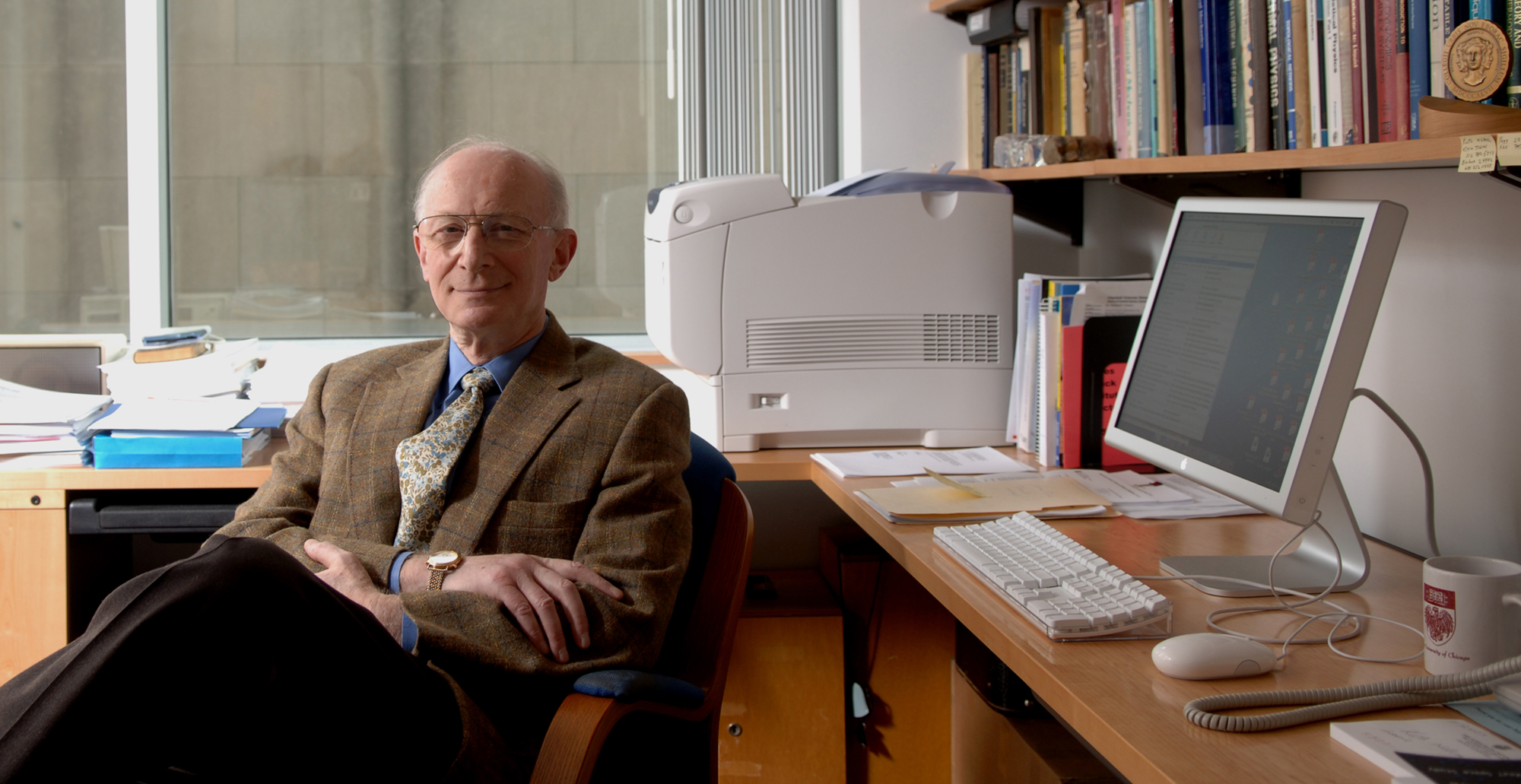
Stuart A. Rice, the Frank P. Hixon Distinguished Service Professor Emeritus in Chemistry, 1932–2024. (Photography by Dan Dry)
Remembering Stuart Rice.
In December 2024 Stuart A. Rice, the Frank P. Hixon Distinguished Service Professor Emeritus in Chemistry, died at the age of 92 (see Deaths). President of the University of Chicago Paul Alivisatos, AB’81, pays tribute to an incomparable teacher whose influence on him endures.—Ed.
Enjoying pride of place in my office is a by-now-decrepit treasure: my original copy of Physical Chemistry (Wiley, 1980), a textbook by R. Stephen Berry, Stuart Rice, and John Ross. I first encountered it as a junior in the College some 45 years ago, and it has been with me ever since. It is a book that showed me a winding path that I still follow, a path with as many open questions as questions that have been solved.
This tome consists of three idiosyncratic sections, one by each of the aforementioned authors. Steve Berry’s quantum mechanics section and John Ross’s kinetics section capture an adventurous spirit. Equal parts compendium of images that seem repurposed from a basic freshman chemistry lecture and discourses into mathematical foundations that would have been challenging even for a postdoctoral researcher, this was a work to be contended with. For someone destined to be a physical chemist, it remains unquestionably the one great book of its kind.

After making it through the first quarter of the course that shared Physical Chemistry’s name, which in 10 weeks covered the entirety of the Berry quantum section of the textbook, I was astonished to see that Stuart Rice himself was the professor for the Winter Quarter, covering statistical mechanics and thermodynamics.
From the moment he picked up his chalk and began to lecture elegantly, I was transfixed by this magician. He spoke extemporaneously, with no notes and no interruption in his flow, for the full 50 minutes, all in a kindly but authoritative voice. He was exact and illuminating and inspiring. As long as he continued to speak, he rendered his difficult subject with simplicity and clarity. His section of the great textbook similarly stands apart from the other two in its completeness and beauty. In Stuart Rice I encountered a person with an expansive love of a subject that I also found compelling and inspiring.
He was a master of intellectual sleight of hand, setting up a problem just so, knowing in advance that one or another of his seemingly innocuous assumptions was essential to a direct solution to a problem otherwise intractable. Yet his toy problems were chosen perfectly as guides to show where the traps lay, and where the good unanswered questions still hid for those willing to look for them, for those who wanted to extend the boundaries of knowledge. His was a kindly brilliance. Stuart always seemed to see things a few layers deeper than anyone else.
A year later, now determined to continue in the study of physical chemistry, I went to him for advice on where to go to graduate school. Every program but the one at the University of California, Berkeley, featured a full two years of coursework and exams before one could be qualified to start research in earnest. The Berkeley folks were indifferent to these kinds of formal constraints. Find your own way, they said. Could such a program be serious? I am sure the advice he gave me was hard for him to give, since Berkeley had only recently managed to lure away his friend and protégé, the great UChicago physical chemist Yuan T. Lee, who just a few years later won the Nobel Prize in Chemistry for his studies of molecular collisions and reaction dynamics.
In the event, Stuart looked at me sardonically and said, “Paul, have you not yet understood the point? As a UChicago undergraduate you leave here with the skill to learn any existing human knowledge, without needing anyone to hold your hand.” He was of course right about UChicago undergrads, then and now—and he was one of many UChicago mentors whose passion and wisdom set so many of us on our right paths. I followed Stuart’s advice and went to Berkeley, and from there on to a life of science, beauty, and challenge, always searching in the footsteps of this great master.
When I learned that Stuart had passed away, I felt a great sadness, along with my enduring gratitude to him. Farewell, my teacher Stuart Rice.
